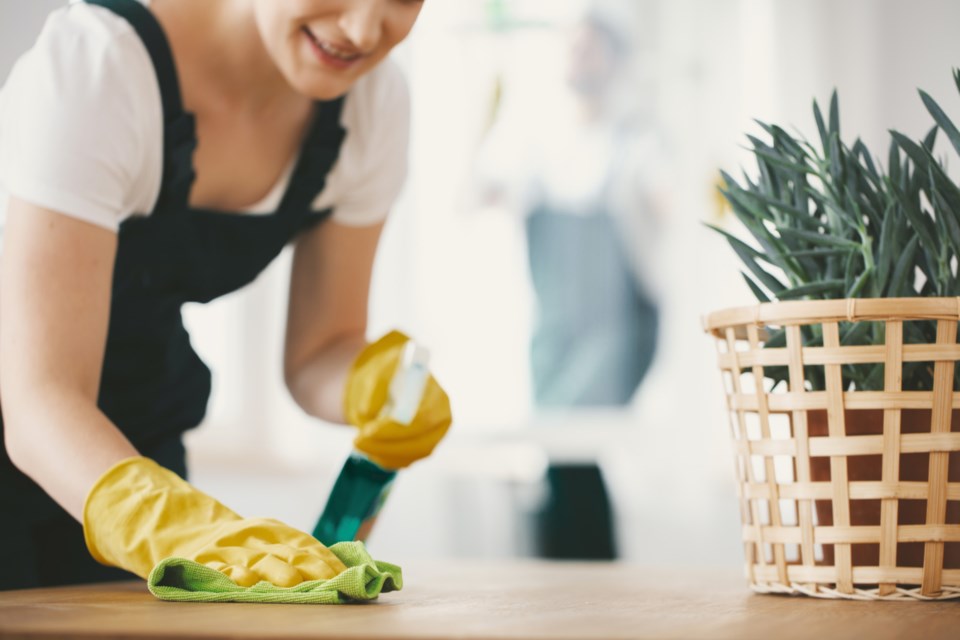THUNDER BAY – While Ontario’s strict physical distancing guidelines remain in place, domestic workers like nannies, babysitters, painters, and cleaners were allowed back into clients’ homes this week, as the province rolls out Stage 1 in its COVID-19 reopening plan.
For domestic cleaning companies in Thunder Bay, reopening is complicated. Many clients remain hesitant, concerned over health risks or squeezed financially by the pandemic. Bringing employees back is also proving a challenge, with less work to go around, and school closures keeping many at home caring for their children.
Louisa Posthumus, owner of Executive Cleaning, said she welcomed Premier Doug Ford’s announcement last Thursday that cleaning services could reopen, but it would likely be weeks before her company will be back in clients’ homes.
Most employees were hesitant to return until full-time hours were available, she said, especially since working part-time would net less than the $2,000 per month Canada Emergency Response Benefit (CERB). Building full-time schedules is proving difficult – while some clients were eager to resume services, many others aren’t there yet.
“There’s a lot of people who are still very, very reluctant,” Posthumus said.
She’s now reaching out to clients to determine when there’s enough interest to restart.
“If I can get enough people on the list, then I can rehire and we can start up again.”
Joni Pike, the owner of Maid For You Cleaning, said it’s simply too soon. While she’s feeling the financial pressures of a months-long closure, many of her staff and clients are not ready.
“I have a lot of staff who are babysitting grandchildren, taking care of elderly parents,” she said. “And a lot of people financially will not be able to afford it. They don’t have their regular income.”
While she was cautiously optimistic about the low number of confirmed COVID-19 cases in Thunder Bay, she was concerned over a possible second wave if reopening goes ahead too quickly, and is keeping an eye on provincial statistics.
“I honestly didn’t think they would open up this quickly,” she said. “I think I’m just going to hold off a bit and see how those numbers are.”
Services will look a little bit different when they do resume. Pike said employees had access to gloves, masks, and sanitizer, and would make sure to maintain physical distancing with clients.
Posthumus was taking similar steps at Executive Cleaning, and felt the risks for both staff and clients was low as long as proper precautions were used.
“We wear gloves, we have masks and proper sanitizing equipment,” she said. “With contact on the surfaces, I don’t think we’re at a high risk at all.”
The American Centers for Disease Control and Prevention (CDC) recently reduced its assessment of the risk of contracting COVID-19 from touching surfaces, saying the virus “does not spread easily” other than through person-to-person contact – while adding “it may be possible” to get it by touching a surface and then touching one’s mouth, nose, or eyes.
Posthumus’s main concern was to limit contact between clients and staff. Her company will ask clients to either leave the home or move to another area during cleaning.
Molly Maid, which has a franchise in Thunder Bay, was similarly confident about resuming operations. The company has implemented some new protocols in addition to providing PPE – employees show up in separate vehicles when cleaning in teams, and clients and staff alike face a regular health check questionnaire.
Marketing and growth manager Kelly Riley-Dunbavin said the situation was mixed at franchises across the country. The majority were ready to offer services, but the company had faced similar challenges with employee availability and customer hesitance.
At the same time, companies were hopeful the pandemic would spark renewed interest and appreciation for their work.
Riley-Dunbavin said she’s having conversations with people who haven’t used the service in the past, but after months in the house – often while balancing child care and working from home – are ready for a hand.
“A lot of people are realizing they hate cleaning,” she laughed. Others are simply more concerned than ever about keeping household surfaces clean.
For Posthumus, renewed appreciation for the work was the one silver lining of the pandemic.
“Before, it was sort of taken for granted,” she said. “But when you don’t have it anymore, it makes a big difference. I’m sure people think the same thing with hairdressers.”
“Customers have had to go almost two months without any help to get some of these things done around the house. [Some] physically can’t do it themselves. Now they realize, oh my goodness, this is a necessity.”
Still, the financial pain of the pandemic is likely to linger. Partially forgivable loans of up to $40,000 through the Canadian Emergency Business Account had helped, said Posthumus, but not enough to make up for mounting losses.
While Pike said the shutdown wasn’t an existential threat to her business, she anticipated a long road to recovery.
“I’m not worried [about going out of business],” she said. “I’ve worked very hard to get where I’m at after 32 years. But I know it’s going to take a long time to go back to where I was. And it’s a big financial loss.”
